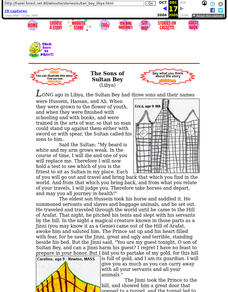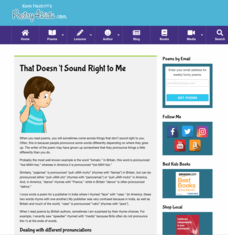Curated OER
What Famous Landmarks Have You Visited?
Responding to blog posts can increase written communication skills, critical thinking skills, and the use of social media as a means for discussion. Kids will compose a blog post in response to the provided article related to famous...
Curated OER
The Sons of Sultan Bey (Libya)
Imagine you could increase reading comprehension and social media skills at the same time. Learners can read and then respond to the tale "The Sons of Sultan Bey." Their comments are guided by comprehension-style questions and can be...
Curated OER
Is It Ethical to Eat Meat?
Have your class join a blog about whether or not eating meat is good for you. They'll read several passages regarding meat processing and consumption, then they post what they think. There are six critical-thinking prompts to help them...
The New York Times
401 Prompts for Argumentative Writing
Sometimes the hardest thing about an argument essay writing assignment is coming up with a question. A four-page list of prompts includes a range of topics, from social media and smart phones to video games and sports. The list is a...
Curated OER
Do Presidential Candidates Need to Be Good Debaters?
Blogs can be a good way for learners to engage in writing, critical thinking, and social media in a formal way. The New York Times has provided learners age 13-18 with an article, background information, and several prompts to get them...
Freeology
MyPage
Engage students in sharing about themselves with this social-media-inspired student interest survey. Using the format of a Facebook page, the worksheet asks kids to fill in information about their interests, family, friends, summer...
Curated OER
The Adventures of Huckleberry Finn Packet
Readers of The Adventures of Huckleberry Finn are directed to complete two projects as a part of their study of Mark Twain’s novel. Individuals craft an organized notebook containing all their work during the study, and they...
Curated OER
What Is Your Favorite Place?
Good writing can come from personal places. Budding online authors read an excerpt from a narrative-style newspaper article and then respond to several related writing prompts. They compose blog responses that use vivid imagery to...
Curated OER
What Do You Think of Obama's Oval Office Speech on the Oil Spill?
Kids age 13 and older are asked to read the provided Times article and background information in order to construct a thoughtful blog response to Obama's first Oval Office speech. They work to address each of the related critical...
Curated OER
When Is It O.K. to Replace Human Limbs With Technology?
Today's blog topic is robotic limb replacement for amputees. Upper graders read the related article and argument, then compose a blog response that addresses the questions provided. This is a great way to get kids thinking about ethics,...
Curated OER
The Learning Network: More Like Disney
A great source of high-interest reading for the language arts classroom! Meant to be used with an article also available on the New York Times website, this worksheet provides 10 comprehension questions about the reading as well as one...
Curated OER
Student Opinion: Who Inspires You?
Inspire your class to write about role models and personal heroes with this resource from The Learning Network. Class members read a New York Times article excerpt about basketball star Jeremy Lin and how he inspired the author. After...
Curated OER
Student Opinion: Are You Popular, Quirky or Conformist?
Approach the topic of popularity with this resource from the New York Times and their Learning Network series. The article is about Alexandra Robbins' "Quirk Theory." Learners respond to the article excerpt either on paper or...
John F. Kennedy Center
Writing a Myth
Tap into the imaginative minds of young learners with a creative writing activity. After reading the myth Giants and Mosquitoes, this student guide supports young writers as they brainstorm and develop their very own creation myths....
College Board
AP United States History Practice Exam
Looking for a practice set for the AP United States History exam? The packet for the 2015 exam provides just such an opportunity. Included in the resource are the same instructions, question types, and timing guides used in the May...
Centervention
What Makes Me Happy Today?
Here's a worksheet that will put sunshine on papers and smiles on the faces of young learners as they draw pictures and write a short explanation of what makes them happy today. A great way to show gratitude for the good things in life.
Curated OER
Poems: calligrams
Have fun with shape poems! First and second graders write calligrams that add to the meaning of their poems. Great for your poetry unit or if you want to combine poetry and art lessons.
Curated OER
Student Opinion: When Did You Have a Great Conversation?
Conduct a classroom conversation about communication using this resource as a jumping-off point. For this The Learning Network activity, learners read an excerpt from The New York Times opinion piece, "The Flight From Conversation," and...
San Diego County District Attorney
Just Because... Stereotypes and Gender
Help young learners identify and break down stereotypes with this these lessons and worksheets, which discuss expectations placed on others based on such factors as gender, race, and sexual orientation.
Poetry4kids
That Doesn’t Sound Right to Me
Does pajamas rhyme with llamas to you? If it does (and even if it doesn't), an online lesson on rewording poetry for regional pronunciation may be helpful for you and your students.
abcteach
Ellis Island Writing Prompt
In this writing prompt worksheet, students read the questions and story starter about Ellis Island. There are provided lines for the story which the students will write.
Learning Station
Point of View—Picking Favorites
For this writing worksheet, learners discover how a story can change depending on the point of view the writer has chosen. Students read several excerpts from stories and respond in writing to how they are different.
Learning Station
More Than Anything in the World
In this reading comprehension worksheet, students will read a short passage noting point of view. Students will then complete the story adding problem solving to the story ending.






















